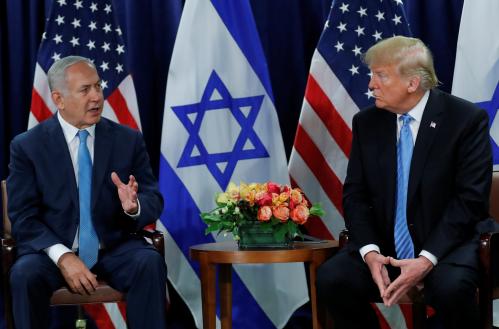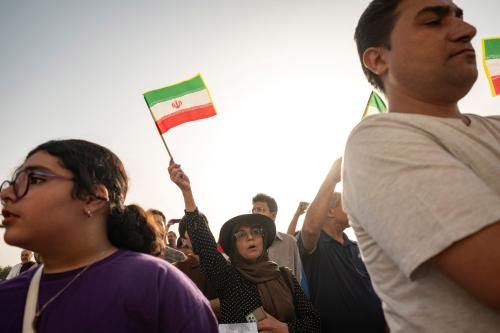For many Israelis, write Daniel Byman and Tamara Cofman Wittes, the embrace and policies of the Trump administration seem like an overwhelming win. Yet the Trump administration’s policies also carry several risks for Israel. This piece originally appeared in Lawfare.
For many Israelis, the embrace and policies of the Trump administration seem like an overwhelming win. President Trump has good relations with Prime Minister Benjamin Netanyahu, certainly as compared with President Obama (the distaste was mutual). In addition, many of Trump’s senior officials vie with one another to maintain good relations with Jerusalem. Gone are the days when a U.S. administration would chastise Israel for building more settlements in the West Bank or killing civilians in Gaza. Instead, Trump’s administration has moved the U.S. embassy to Jerusalem, cut aid to Palestinian refugees, ripped up the 2015 Iran deal, and otherwise embraced many of Israel’s long-standing demands. In addition, Trump’s muscular rhetoric and his administration’s hostility to Muslims play well with Israelis who felt Obama was weak, hesitant to confront aggressors in the Middle East, and eager to embrace Islamists. In addition, Trump’s cozy ties to the Arab Gulf states advance the Israeli government’s strategy to build upon the interests it now shares with Arab governments to promote regional cooperation unconstrained by that pesky conflict with the Palestinians.
Yet the Trump administration’s policies also carry several risks for Israel. The first is the president’s fundamental reluctance to engage in trying to cajole or push the region’s trajectory in a direction favorable to U.S. interests. For as long as the United States has been the unrivalled external power operating in the Middle East, Israel has relied on the United States to shape events in the region in its favor. During the Arab Spring, Israel relied on Obama to protect its interests (such as when its embassy in Cairo was overrun by Egyptian protestors), and it held back from taking a side where Obama was reticent, as in the early years of the Syrian civil war. For all his tough talk, Trump is skeptical about U.S. intervention in the Middle East and, in general, has not tried hard to shape events there. For example, he’s been unwilling to turn the screws on America’s fractious Gulf partners—Qatar, Saudi Arabia, and the UAE—to mend fences, although their internecine argument is impairing the broader effort to combat the Islamic State and contain Iranian influence. In Yemen, the Trump administration continues to back a fruitless military campaign by Saudi Arabia and the UAE while not investing resources in a diplomatic effort to end the fighting and extract its allies from a quagmire.
For as long as the United States has been the unrivalled external power operating in the Middle East, Israel has relied on the United States to shape events in the region in its favor.
In Syria, Israel faces urgent concerns about Iran seeking to establish a permanent military presence, transfer sophisticated missiles to Hezbollah, or building weapons-manufacturing capabilities on Syrian territory to benefit Hezbollah. Trump, for his part, has flip-flopped on the U.S. role in Syria so many times it’s made observers dizzy—and this unreliability is yet another vulnerability the Trump administration presents for an Israel that relies on American security guarantees. Trump initially escalated the U.S. military campaign against the Islamic State, then declared the movement vanquished and expressed a wish to bring U.S. troops home quickly. Corrected by his advisers about both the Islamic State’s continued viability and about America’s other interests in Syria, he has relented for the moment—but the administration’s Syria policy remains hard to understand. While national security adviser John Bolton declares U.S. forces will stay in Syria until an Iranian withdrawal, and special envoy Jim Jeffrey ramps up U.S. engagement in the U.N.-led diplomatic process, the U.S. military remains tightly focused on an anti-Islamic State mission rather than deterring Iran or providing leverage for a diplomatic settlement to the civil war. It would be beneficial for Israel if the United States would maintain its military presence in eastern Syria, coordinate Turkey and other allies to maintain pressure on the Islamic State, and deter Iran from building permanent bases there. But it’s hard to see how the 2,000 or so U.S. forces embedded with Kurdish fighters in northeast Syria will deter an Iranian presence that is concentrated in the populated areas closer to Damascus and enjoys freedom of movement in the increasingly large areas controlled by the Assad regime. Likewise, the United States cannot help Israel deny Iran permanent installations or a “land bridge” between Iraq and Lebanon through Syrian territory without a greater troop presence and wider authorization than it has now.
Indeed, the mismatch between ends and means in Trump’s Iran policy presents a grave challenge for any Israeli government that looks to Washington to alleviate its security problems. After dramatically pulling out of the Iran deal and re-imposing sanctions, the administration unveiled a set of policy goals so unrealistic and under-resourced that Iran expert Suzanne Maloney dismissed the administration’s alternative plan as “a grab bag of wishful thinking wrapped in a thinly veiled exhortation for regime change in Iran.” Rhetoric vacillates from regime change and demands for massive concessions to dangling negotiations with no serious follow up and no attempt to get key allies on board.
A further risk for Israel results from President Trump’s carelessness regarding the Israeli-Palestinian conflict. Although it’s true that Trump’s recognition of Jerusalem as Israel’s capital and cutoff of aid to the agency serving Palestinian refugees win plaudits from the Israeli prime minister, the uncritical approach they represent also presents Benjamin Netanyahu with a dilemma. For all of his years in office, Netanyahu has been able to rely on Washington to protect his right-wing party and coalition partners from their own worst instincts. Like an overbearing but ultimately responsible parent, previous administrations imposed policy constraints that were Netanyahu’s excuse for why he could not expand settlements into new territory, keep Gaza under a full quarantine, or pursue other policies that are popular with his right-wing base but strategically self-defeating. Now, however, Washington’s golden handcuffs have been removed from Netanyahu’s wrists, and the pressure is building in his coalition to press forward with steps that might have irreversible consequences for the two-state solution—a solution even President Trump won’t say he supports.
President Trump’s final vulnerability for Israel is one in which Prime Minister Netanyahu has been an active and willing participant: building an increasingly partisan political base of support for Israel’s approach to the Palestinian issue inside the United States. Trump wooed evangelicals and orthodox Jews, including Republican mega-donor Sheldon Adelson, by moving the U.S. embassy to Jerusalem, for example. But in our polarized times, with peace negotiations in deep freeze, that effort might now be producing a backlash among grassroots activists on the American Left. Although many Democratic politicians have strong records of support for Israel, the Democratic base is decreasingly supportive of Israel over the Palestinians in their century-old conflict. According to one 2018 poll, Republican support for Israel over the Palestinians is almost three times as high as that of Democrats. Research by Shibley Telhami suggests that settlements, and human rights issues like housing demolitions, are areas that produce more disquiet amongst Democrats. Netanyahu’s support for Mitt Romney in the 2012 presidential election, followed by his vocal criticism of the Iran deal, also put him at the center of contentious American debates, and Democrats are understandably holding a grudge. As the U.S.-Israel relationship becomes more of a political football in the United States, Israel has to worry that U.S. policies it favors that are driven by Trump’s domestic politics today, may be driven by domestic politics again tomorrow—but in the opposite direction. Moreover, Netanyahu’s own dismissive attitude toward American Democrats—and their liberal Jewish-American supporters—may begin to shift the way the Israeli public sees the alliance with Washington—reducing consensus in Israel for a strong relationship with the United States and making it harder for future Israeli prime ministers to invest political capital in ties with Washington.
Some of Washington’s current reticence to weigh in heavily to shape the region’s trajectory reflects a shift in the American body politic. Obama too shared Trump’s skepticism about involvement in the Middle East, suggesting that this attitude is not confined to America’s current capricious leader and that it spans the political divide. Americans see fighting terrorism, not resolving regional disputes, as the country’s top priority in the Middle East—and now Trump has downgraded counterterrorism as a national security priority relative to competing with China and Russia. Even after Trump leaves office, then, Israel is more likely to see a disengaged America.
But the politicking over Israel inside the United States threatens to make that problem for Jerusalem even worse. The multiple centers of power in America are highly unlikely to remain in one party’s hands for long; it rarely has. That’s why it’s been so valuable for Israeli leaders, regardless of their own policy preferences, to cultivate relationships with politicians across the American spectrum and at multiple levels of government. A future Israeli leader would do well to reverse Netanyahu’s heavy bets on a singly political party, recognizing instead that a reliable, long-term partnership is built on wide consensus in its favor both in Washington and in Jerusalem. Israel’s fractious coalitions and tense security environment, however, give it a short-term mentality when it comes to decisionmaking, and its leaders will press for partisan advantage. In the years to come, Israel may find itself alone just when it most needs friends.
The Brookings Institution is committed to quality, independence, and impact.
We are supported by a diverse array of funders. In line with our values and policies, each Brookings publication represents the sole views of its author(s).









Commentary
In Trump we trust? Israel and the Trump administration
October 26, 2018